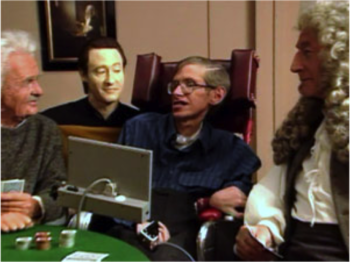Stephen Hawking’s Death: One Christian’s Reaction
On the 14th of March, 2018, which ironically happens to have been Albert Einstein’s birthday (and Pi day), Stephen Hawking died.
As a theoretical physicist, most of his scientific contributions revolved around black holes (no irony intended), probably most significantly in that he noticed that quantum mechanics requires that over time a black hole would lose mass, something relativity would not have predicted (in something called Hawking Radiation). He also contributed to discussions of the origin of the universe, speculating that the entire universe may be essentially a singularity in reverse (something rather like a black hole vomiting up its guts)–though this idea is one some other physicists do not agree is viable based on observational data (notably Hawking’s past collaborator Roger Penrose).
Hawking was more than just a physicist who made some significant contributions to the understanding of the universe. He was the most famous physicist of my lifetime (though not anywhere close to being as important as Einstein was, to be honest) and a significant figure in popular culture. His long-term degenerative illness, Lou Gehrig’s Disease (or ALS), which restricted him to a wheelchair and a robotic voice, are well-known world-wide–or perhaps a better word would be “infamous.”

Stephen Hawking on Star Trek: The Next Generation in 1993 (with “Einstein,” Data, and “Newton”)
He was himself a science fiction fan, who appeared on an episode of Star Trek: The Next Generation, which I’ve seen, playing poker with Data, Einstein, and Newton. He also appeared The Big Bang Theory, Futurama, and The Simpsons (in episodes I haven’t seen).
He has been referenced in popular culture outside the shows he voluntarily cooperated with, including (believe it or not), Epic Rap Battles of History.
I imagine if you asked people prior to his death, “Who is the most intelligent person living today?” many would have put Hawking on their short list, perhaps in first place. His personal opinion concerning what if would mean for humanity to meet aliens made headlines worldwide. And he offered opinions on numerous other matters, such as Scottish independence (which he opposed).
I’ve read two of Hawking’s books in which he attempted to explain his ideas on the universe to a general audience. Not that I believe my opinions are hugely important (hey, I’m not a theoretical physicist), but I thought A Brief History of Time, first published in 1988,was interesting and informative. In contrast, I found The Grand Design, published in 2010, which went out of its way to say the idea of God is not needed to explain the universe, while at the same time saying that a unified theory linking quantum mechanics to relativity may not be possible, to be a massive cop-out. (My thinking: “You are both saying that maybe science may never understand a key and very basic feature of the universe and at the same time saying even though you don’t understand the universe you are sure God had nothing to do with it. Poor reasoning!”)
A Brief History of Time actually mentioned God on numerous occasions, though usually in the context of explaining how the universe does not work–that is, God could have made things work one way, but science things that isn’t correct, because etc. Hawking also stated at one point that he wanted “to know the mind of God” in his physics, which is something Einstein had said earlier, a statement he would later repudiate as a mere figure of speech.

While he made several prior statements questioning the idea of life after death and the existence of a personal God, it was not until 2014 that Hawking plainly stated he was an atheist and that he thought belief in God makes no sense. So it seems to me, as an outside and non-professional observer, that Hawking became increasingly hostile to the idea of God during his lifetime–while simultaneously adopting increasingly poorly-reasoned positions on the nature of the universe (in my opinion, of course). To me, the connection between the increased hostility towards God and deteriorated thinking seems obvious.
Perhaps there is also a connection to Dr. Hawking’s protracted suffering with ALS and his hostile attitude towards God. Though I don’t think so. In my observation, people who suffer usually find themselves feeling closer to God than those who do not.
I really cannot know what was in Dr. Hawking’s mind. I can hope that his increased support of atheism over time was merely a response to the atheism of his peers. Perhaps he actually might have wondered it God is real–perhaps he may have even secretly found personal faith. Perhaps he even was a “closeted” Christian. Though there’s no particular reason to believe that to be the case.
I hope Stephen Hawking finds a place in the eternity he publicly denied exists. Or perhaps, if God has allowed it, a Stephen Hawking from an alternate universe will find his place in eternity, in the presence of God.
I hope so.











































What is so interesting about this, which I still find incredible, is that on my show Tuesday, my guest and I were talking about black holes, string theory, quantum physics and more. Then the very next day, we hear that Stephen Hawkings passed away.
During the discussion, my guest did a wonderful job tying in the idea of the multiverse with the message of salvation. I would have loved it if by some chance, Stephen had heard it before leaving this Earth.
Another thing of note is this idea that brilliance is an atheistic attribute. Over time, people have come to believe in this idea that the more you know about ONE particular thing in the observation of the world around us, then you acknowledge that God had nothing to do with it. It amazes me how EXPERTS in one field can make these far reaching statements. I mean, a doctor who is an expert in cardiology can’t expressly say he knows more about the human body and there can come to some conclusion about the entire human body.
The same thing goes for ONE FIELD OF STUDY in the scientific discipline. How can a scientist make a profound when she doesn’t know everything? But perhaps you’re right Travis. Maybe he bowed to the pressures of the day.
I do think brilliant people are harder to please but at the end of the day, a lot of very smart people fall to their knees before their Heavenly Father, prostrate even realizing their brilliance has NOTHING on His omniscience.
And I enjoy reading your opinion! Go Travis!
In my experience in a number of online discussions with atheists, Travis, there’s a lot of poor reasoning masked as intelligence. Over and over I hear the demand that theists “demonstrate” God’s existence. It doesn’t seem to matter that you clearly state that the invisible can’t be demonstrated by the visible, that the supernatural can’t be proved by the natural. They end up saying odd things like I don’t disbelieve in god, I just don’t believe he exists.
But I agree with you—ALS is not a reason for any degeneration in the thinking processes, at least based on others who suffered from the disease. Now the disease of sin is a different story!
Would that Dr. Hawking dealt with his sin problem before it was too late.
Becky